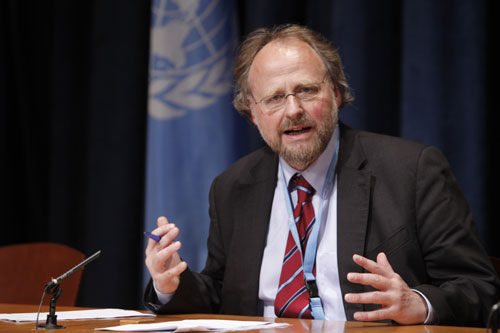
29 October 2013 – Harmful practices inflicted on women and girls can never be justified in the name of freedom of religion or belief, an independent United Nations human rights expert told a General Assembly committee dealing with social, humanitarian and cultural issues today.
“Countless women are exposed to complex forms of human rights violations based on both religion or belief and their sex,” said Heiner Bielefeldt, the Special Rapporteur on freedom of religion or belief.
The expert’s latest report, which he presented to the Third Committee, focused on two human rights, namely freedom of religion or belief and gender equality. “My main message is that there is much more room for synergies between those two rights than people generally assume,” he told reporters after his presentation.
“Often you find the assumption that, you go either for religion or for gender emancipation and you can’t really combine the two, which I would find not only wrong but dangerous.”
